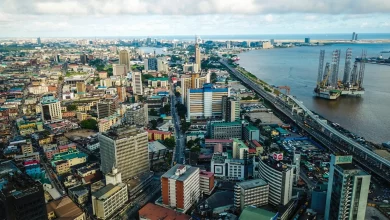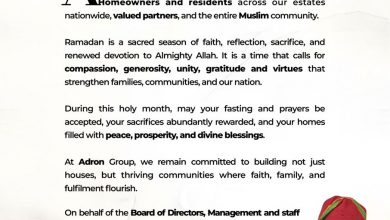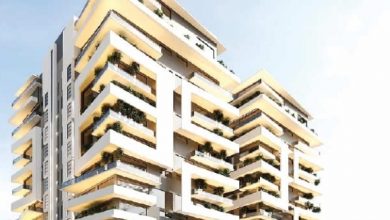Lagos luxury estates where residents live in misery | Prestige Real Estate News
Lagos luxury estates where residents live in misery | Prestige Real Estate News

By
Chijioke Iremeka
Affluent estates in Lagos command luxury prices comparable to those in Dubai, London, or Johannesburg, yet fall far short of delivering the essential services found in some of those cities. Despite paying millions for an upscale lifestyle, residents grapple daily with crumbling roads, erratic water supply, and deteriorating infrastructure. Chijioke Iremeka writes about the harsh reality inside these wealthy enclaves and how residents invest heavily in a lifestyle that remains frustratingly out of reach
In Lagos, where appearances often matter more than substance, the real estate market starkly mirrors Nigeria’s deeper urban dysfunction. Across the upscale neighbourhoods of Lekki, Ikoyi, Victoria Island, Banana Island, and the emerging ‘premium’ estates on the mainland, thousands of residents awaken daily to a frustrating and sobering reality.
To Paul Omenka, who lives in Lekki Phase 1, the affluent estate represents a costly illusion.
There, residents pay millions of naira and dollars in rent, mortgages, and service charges for homes that fail to provide even the most basic amenities.
“In a place like Lekki, where the promise of elite living once enticed many, the reality today is far from glamorous,” Omenka said.
He noted that in many of Lagos affluent estates, residents still depend heavily on private boreholes or tankers for potable water, as the municipal supply remains unreliable.
Many roads within these estates are poorly constructed or left unpaved, washing away with every heavy rainfall and turning into muddy, impassable tracks.
“Waste disposal is erratic at best. Drainage systems are either open, clogged, or simply nonexistent, creating perfect breeding grounds for mosquitoes and escalating flood risks during the rainy season,” he added
Saturday PUNCH gathered that despite these glaring deficiencies, tenants and homeowners dutifully pay service charges that can run into hundreds of thousands, sometimes even millions of naira annually.
“It’s not just about potholes or the frequent power outages that Lagosians have long come to accept as normal; the problems run far deeper,” Omenka enthused.
He noted that diesel generators hum constantly due to the unreliable power supply, while security, something that should be guaranteed in gated communities, is often outsourced to ill-equipped guards.
“Sometimes, even after a light rain, the streets remain waterlogged,” he said.
Saturday PUNCH learnt that while Lagos residents in these overpriced estates struggle to manage their environment, similarly priced communities abroad, in cities like Dubai, London, or Johannesburg, offer flawless infrastructure, 24/7 utilities, advanced security systems, and efficient estate management.
“There, service charges are transparent, maintenance is visible, and residents have a genuine voice. In Lagos, there is a huge gap in estate management, a system designed more to collect fees than to serve residents,” Omenka noted.
“This growing disparity between price and value is causing deep concern among homeowners, tenants, and real estate stakeholders in Nigeria,” he added. He questions how much longer people will continue to pay for a luxury that exists only in brochures and real estate billboards.
According to him, Lagos is a city defined by hustle, resilience, and ambition. Yet, when residents pay premium prices, they don’t get the premium services they deserve.
He described the current situation not just as disappointing, but exploitative.
“As more residents begin to speak out, the demand for transparency, accountability, and genuine service in these estates can no longer be ignored. It must be strengthened so that people get real value for their money,” he concluded.
Persistent absence of clean water
In a more troubling development, a real estate mogul, Deji Giwa, publicly voiced his deep frustration over the persistent absence of clean water in his estate, despite paying exorbitant fees for these basic services.
He revealed that for the past two years, his estate has been plagued by foul-smelling, brown water unfit for cooking, bathing, or even brushing teeth.
According to the businessman, who is also a developer, the apartment he purchased to operate a short-let facility has instead become a financial burden, as guests increasingly cancel bookings upon discovering the poor water quality and frequent power outages.
He lamented, “This place was sold to us as luxury. We were promised a 24-hour power supply and clean, potable water. This was supposed to be Banana Island, but we are fed up. Despite constant complaints, nothing has been done. I’ve had to go to my other property just to bathe and work from home because these essential services are simply not available here. It’s that bad.”
A frustrated Giwa lamented, “There’s no light. Sometimes, I have to sit at a café, spend extra money just to work. Now, there’s been no water for 24 hours. As I speak, I haven’t had a bath. Yet, we are being asked to contribute N100,000 for water, and I have paid all my service charges. I don’t owe a dime.”
Reflecting on the financial toll, Giwa said his greatest mistake was paying more than a year’s rent in advance.
“I bought the apartment for short-let purposes, charging N200,000 per night. I paid N53 million per year, that’s N106 million for over two years. But now, guests leave after just one night because of the poor facilities,” he added.
Giwa explained that he is now forced to stay in the apartment himself due to the lack of income, but even that has proved difficult.
“I bought this for business, but I haven’t made anything. It’s all losses. I thought that if I couldn’t make money from it, I could at least live here. But I can’t cope. I haven’t brushed my teeth or bathed properly because of the water problem,” he said.
In a video shared online, Giwa was seen turning on taps and showers with no water flowing. He also showed stacks of bottled water, which he uses solely for brushing his teeth.
He noted that estate managers had promised that a new service company would take over by June or July, but questioned why residents must continue to endure such hardship until then.
“So, we’re expected to endure this until July? I’m demanding the services I paid for. There are over 100 of us in a residents’ group, and everyone is complaining. I only bought two apartments; some bought more. What if someone used their life savings for this, hoping to rely on it, and now they’re making no income?”
Giwa warned that if nothing is done following his video, he will take further action by disclosing the name and location of the estate.
The overpriced estates
Affluent estates in Lagos, such as Banana Island, Ikoyi, Lekki Phase 1, and Victoria Island, are often regarded as symbols of wealth, prestige, and modern urban living. However, Saturday PUNCH reports that beneath this luxurious façade lies a complex web of challenges threatening both the sustainability and quality of life in these neighbourhoods.
Despite their exclusivity, our investigation revealed that these estates face infrastructural and environmental issues typically associated with less affluent parts of the city.
During visits to these areas, we discovered persistent flooding, unreliable power supply, and crippling traffic congestion.
Sources explained that inadequate urban planning, unchecked real estate development, and poorly maintained drainage systems have worsened these problems, exposing the limits of Lagos’s urban management even within its most privileged communities.
Saturday PUNCH further observed that environmental concerns such as land reclamation, soil erosion, and the loss of green spaces pose serious long-term threats.
Coupled with rising insecurity and stark socio-economic disparities between residents and neighbouring communities, these factors contribute to underlying social tensions.
According to the Nigeria Housing Market, a platform dedicated to empowering real estate stakeholders, while both Lagos and Dubai boast high-priced luxury estates, Dubai significantly outperforms Lagos in terms of infrastructure, governance, and reliability.
This makes Dubai’s property market better aligned with cost-to-value expectations.
NHM noted that Lagos offers prestige and promising returns on investment, but comes with substantially higher infrastructural and regulatory risks.
The platform highlights that Lagos’s affluent estates like Banana Island, Ikoyi, and Lekki Phase 1, remain among Nigeria’s most prestigious places, with luxury homes priced between $500,000 and over $5 million.
“Modern Nigerian luxury properties now incorporate world-class features and amenities comparable to those in top international markets. State-of-the-art home automation, private pools, in-house gyms, and 24/7 security are increasingly standard in high-end Nigerian developments.
“In areas like Banana Island and Victoria Island, residents enjoy waterfront views, upscale malls, fine dining, and proximity to business hubs and amenities that align with international luxury buyer expectations.
“However, when it comes to infrastructure, some global markets still hold an edge. Stable electricity and consistent water supply remain elusive in Nigeria, prompting most luxury estates to rely heavily on private generators and boreholes. While these provide short-term solutions, they underscore critical infrastructural gaps rarely encountered in cities like Dubai or Singapore, where urban infrastructure effortlessly supports luxury living,” the NHM stated.
What you ordered/what you got
A Nigerian chef based in Dubai, Chibueze Ekeh told our correspondent that Dubai’s luxury neighbourhoods, such as Palm Jumeirah, Downtown Dubai, and Emirates Hills, offer properties in a similar or even higher price range but with far superior infrastructure, urban planning, and service delivery.
“Dubai provides uninterrupted electricity, modern road networks, efficient drainage, and a highly secure, well-regulated property market,” Ekeh said. He added that safety, transparency, and thoughtful urban design in Dubai deliver better value for money compared to Lagos, where infrastructural shortcomings and regulatory risks persist.”
“While both markets cater to wealthy buyers, Dubai aligns more closely with global standards of luxury living, making it a more attractive and dependable investment destination,” he added.
Similarly, Iyk Christopher, a resident of Johannesburg, South Africa, told our correspondent that South Africa’s luxury estates, like Sandhurst in Sandton (Johannesburg) and Clifton or Camps Bay in Cape Town, feature comparable pricing.
He noted that high-end homes in these areas range from R10 million to R100 million (approximately $550,000 to $5.5 million), matching the upper tiers of Lagos’ luxury market.
“These estates attract high-net-worth individuals and offer premium amenities, including ocean or mountain views, advanced security systems, and modern infrastructure,” Christopher said.
He highlighted a key distinction: “South Africa’s affluent neighbourhoods generally benefit from stronger public infrastructure, reflecting a closer alignment between cost and quality of life. For instance, Clifton in Cape Town combines beachfront luxury with services that are usually more reliable than those in Lagos.
“In contrast, many Lagos estates rely heavily on private infrastructure solutions, which increase the overall cost of living. While both markets serve elite buyers, the value proposition differs considerably when it comes to service delivery and urban planning.”
Everybody now provide ammenities — Estate Surveyor
An Ikoyi-based estate surveyor and prominent figure in Nigeria’s real estate industry, Dr Meckson Okoro, noted that in Lagos’ affluent estates, every resident has effectively become their own government.
The chartered estate surveyor said, “These estates are meant to be supported by premium services, but unfortunately, everyone has now become a local government unto themselves, providing their own water, security, and other essential amenities to ensure a comfortable life.”
Drawing a comparison between Lagos and cities like Dubai and those in South Africa, he observed that the services available abroad are significantly superior, even in estates that charge slightly less than Lagos.
Okoro said, “In Dubai and South Africa, every neighbourhood is well-developed, with uninterrupted power supply, potable water, and good roads. You can’t find that here. Even in upscale areas meant for high-profile individuals, there is more serious infrastructure and better security.
“In Nigeria, it’s a different story. Individuals have to spend their own money to guarantee comfort, lifestyle, and safety. These are people operating on dollar-based expenditures. It’s not the government making these provisions, so it’s unrealistic to expect better services than those available abroad.”
Reacting to poor-quality water in some estates, particularly in Lekki, he said, “The brown, smelly water is not the government’s fault. The water table here is very low, and to access clean water, you must drill over 150 feet deep, which is very expensive. Most people can’t afford that, hence the discoloured water. But if you can drill deep enough, the water only requires minor treatment to become drinkable.
“Here, what we consume is bottled water. Everyone living in these estates is wealthy enough to afford it. That’s what we drink and use. For cooking and bathing, we buy water from vendors.
“If you visit these homes, you’ll find stacks of bottled water. The residents don’t complain because they’re used to spending millions of naira on rent and operating on dollar-based expenses. They pay without flinching.”
Confirming property prices, he said, “Flats in these estates now sell for as high as $1 million. Buyers know the country is not secure, so they’re paying for exclusivity, safety, and a particular lifestyle. You’d be surprised, there are multivitamins sold for as much as N2 million, and those who need them are still buying.”
Monkey invasion
A viral video reportedly recorded on Orchid Road shows a woman expressing frustration over a persistent monkey invasion at her family home, with the animals damaging window nets and rooftops.
“I left a loaf of bread on top of my fridge, and within minutes, monkeys broke in and ate part of it,” she said. “Monkeys from Lekki Conservation Centre are invading our kitchens. We’ve battled this nuisance for years without any solution. The centre refuses to feed them, so now they enter homes in broad daylight to steal food. We’re exhausted and need help.”
Another resident, Josephine Erosele, shared her fears. She said, “These monkeys break into our homes and destroy things. They tear through window nets to reach food. I worry about diseases from such close contact. Monkeys shouldn’t be near human food. While some keep them as pets, I don’t want them near my kitchen.” Erosele added that she has replaced her window nets multiple times and is tired of shutting windows constantly, which restricts fresh air in her home.
Mr Nelson Igwe warned that residents of Chevron Estate and surrounding areas might be forced to relocate or sell their properties if the problem isn’t resolved. “Monkeys peek through kitchen windows and tear nets and burglar-proof barriers to get food. The new rule in many homes is to hide all visible food or risk property damage. It’s that serious.”
Invasion caused by land reclamation
An environmental expert and Chairman of the Lagos State Urban Forest and Animal Shelter Initiative, Olumuyiwa Majekodunmi, attributed the invasion to land reclamation and habitat encroachment.
“The area has likely exceeded its capacity to support the monkey population. These animals were here before humans, we are the real invaders,” he said.
Majekodunmi stressed that urbanisation must coexist with nature, adding, “When natural ecosystems are stressed, nature responds. This is a basic law of cause and effect, reap what you sow.”
He noted that the Lekki Conservation Centre management is actively seeking solutions.
Protest over Lekki Coastal Road lease
Not long ago, residents of over 100 estates on Lekki Island protested the leasing of the Lekki Coastal Road to private developers by the Lagos State Government.
They were angry that Governor Babajide Sanwo-Olu, instead of repairing the road as promised, temporarily leased it out, a move feared to become permanent.
The protesters warned that without urgent infrastructure improvements before key projects like the Dangote Refinery, Free Trade Zone, and proposed airport become operational, Lekki could face gridlock similar to Apapa, harming the economy and residents’ quality of life.
Olorogun Emadoye, President of the Lekki Estates Residents and Stakeholders Association, said the coastal road—originally designed by the Federal Government to connect Lagos through Ondo, Delta, and Rivers states—is long overdue. “The Lekki-Epe Expressway is the only road serving this region. Residents leave by 5am to avoid traffic. There are over 100 estates and communities between the 1004 area and Epe.”
Adebayo Balogun, House of Representatives member for Ibeju-Lekki, moved a motion urging the government to fast-track the construction of the Lekki Coastal Road from Akodo Ise to Victoria Island. This section forms part of the larger Port Harcourt–Lagos coastal road, initially a federal project, now delegated to the state.
Chairperson of Goshen Beach Estate Residents Association, Mrs Teniola Jaiyeola, raised concerns about insecurity and infrastructure.
She revealed that residents built and elevated the only access road to land leased to Christ Livingspring Apostolic Ministry with their own funds, spending over N20 million.
“Contractors warned us not to allow heavy vehicles, but trucks bringing sand and gravel destroyed our barrier once CLAM leased the land,” Jaiyeola alleged.
The Lagos govt reacts
When contacted, the Lagos State Commissioner for Information and Strategy, Mr Gbenga Omotoso, said that the state government is investing significantly in infrastructure and will continue to provide infrastructure where it is needed.
He said, “Lagos is spending heavily on infrastructure wherever it’s necessary both in Lekki or any other part of the state.”
On flooding experienced in these estates, he said, “If the public would stop dumping refuse into the drainage systems, the issue of flooding would be significantly reduced.
“However, Lagos experiences flash flooding primarily because the state lies below the sea level,” he said.
Corroborating his position, the Commissioner for Commerce, Cooperatives, Trade & Investment, Mrs Folashade Ambrose-Medebem, earlier said the government’s commitment to infrastructure development to maximise economic benefits from the Lekki and Lagos Free Zones.
She noted that the Governor Sanwo-Olu’s administration was investing heavily in upgrading the Lekki-Epe Expressway and that the Lekki road expansion was underway through a public-private partnership.
However, the Director of Public Affairs at the Lagos State Ministry of the Environment and Water Resources, Kunle Adesina, commented on the presence of brown water in some Lekki estates, attributing it to various factors.
Speaking on the bad water in the estates, he said, “It depends on the specific area. If the water is contaminated with crude oil, then the residents may need to consult the Pipelines and Products Marketing Company Limited.
“However, if it concerns groundwater issues, they should reach out to the Lagos State Water Regulatory Commission,” he said.
Regarding claims of flooding and poor drainage construction, he continued: “I don’t quite understand what is meant by ‘poor drainage construction.’ It’s important to remember that Lagos is a coastal city, with about one-third of it lying below water level. This naturally makes the city vulnerable to flash floods.
“Flash flooding occurs when there’s heavy rainfall, and the water cannot discharge into the lagoon because the lagoon’s water level is already high. In such cases, the water will only recede once the lagoon’s water level drops. That’s when the flooding on the streets subsides.
“People often talk about poor drainage, but who determines whether a drain is poorly constructed? Many make sweeping judgments without fully understanding the technicalities. The truth is, our drains are designed to be self-regulating.
“They are intended to handle silt or sand, not solid waste. Unfortunately, many drains are clogged with refuse, which leads to stagnant water and flooding.
“Every time there’s a downpour, the drains can’t handle the runoff because they are already blocked. It’s easy to blame the government, but many residents fail to clean or maintain the tertiary drains in front of their homes.
“Our drainage clearing and maintenance programs run year-round across the entire state. No area is singled out, it’s about serving the best interest of the majority at all times.”
Source: Saturday PUNCH







